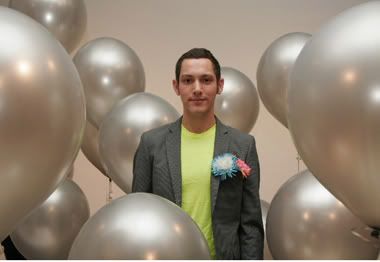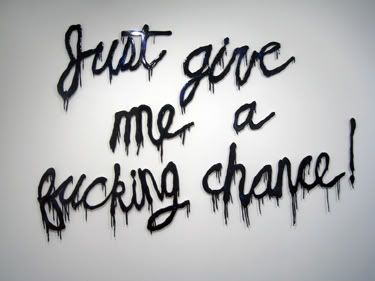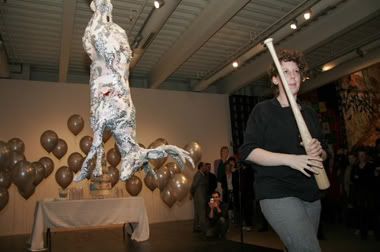If you prefer to listen, download the podcast at oneculture.mypodcast.com.
IN WHICH THE INTERVIEWER GETS BENT OUT OF SHAPE OVER THE WHY OF A PRETTY PICTURE
Annette: All your stuff is hand-made by yourself?
Alex: Yeah.
Annette: Would you ever change that?
Alex: No. I think, well, some people say that someday I'll get an assistant to make the work for me. . . but the time spent with the work is important to me.
Annette: Today it could go beyond that, you could get the work made in another country. Artists do that. They outsource.
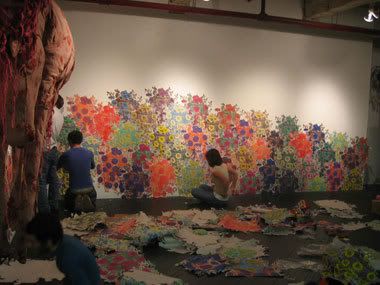
Alex and friends install an exhibition at Black Floor Gallery.
Alex: I really enjoy the materials and the process of doing something. Even though it takes super-long and it's super obsessive, it affords me time to think about why I'm making the work. It's. . . I think a lot when I'm doing these things so it's almost spiritual. It could be compared to doing something like saying the rosary.
It's a repetitive process where you can just sit and think and I think it's important because it can inform the work. Sometimes it changes the work.
I also don't think that if I sent it away for someone else to make that it would ever satisfy me.
Annette: And I just want to say right here (because I've kind of been giving you a hard time) that your work does look beautiful and you're obviously talented.
Alex: Thank you. I wondered that the other day though, when you finish a work and it's picture perfect, it's hard when you make this beautiful object but the only thing people say to you is that it's beautiful.
Annette: It's hard to get past that though, and that's what I think I'm trying to get at right here is that there is something else to your work, but it's so hard to get to.
Alex: Yeah. I mean. . .
I like to think the things that we look at that are beautiful are actually much more complicated, whether it's a beautiful person , or. . . just a pretty package, that they're actually really fucked up inside.
Annette: Yes, but that's almost a cliche, in a way, if you see a beautiful person they're going to be fucked up inside.
Alex: But I believe that to be very true, about everybody and thing.
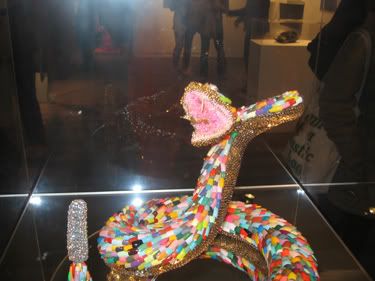
Accessory
IT ALL ENDS IN A FLASH.
Annette: Yes, and I admit that can be a pretty intense thing. I think of that "Accessory" piece you recently had at Fleisher/Ollman, and what I think was a really interesting component of the piece was that it was so much fun to take pictures of. I don't know if you thought about that while you were making it?
Alex: I did kind of.
We can talk about that piece because it's so recent, so fresh in my mind. Originally, I was thinking of calling it "Protect me from what I want" or something like that, and I was thinking about how it's odd to make an object to put it inside a vi-trine. You automatically put a value on it by telling people they can't touch it and I was thinking about malls and jewelry display cases. To put mirrors all around it so people can see themselves coveting something they can't have. . .
It makes a twisted sort of circle. It was fascinating to see all these people taking pictures of this very photogenic snake as you just said.
Annette: Well the pictures turned out great. Especially when you used the flash.
End. Listen to it all at: oneculture.mypodcast.com
